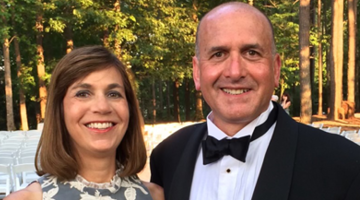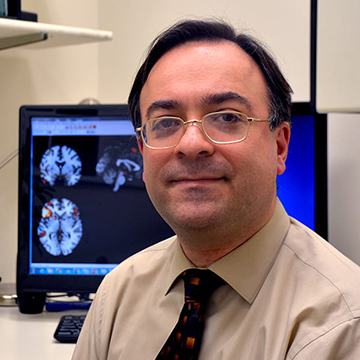Empathy in Action: Tross Family Boosts Progressive Aphasia Research

This story was published in the March 2024 issue of The Philanthropist, a newsletter for supporters and friends of Northwestern University Feinberg School of Medicine. Read the past issues here.
March 15, 2024
For Beth and Nathan Tross, philanthropy supporting neurological disorders such as primary progressive aphasia research is personal.
Beth Tross, a former Montessori preschool teacher in Highland Park, Illinois, was diagnosed with primary progressive aphasia, or PPA, in 2019. The news was devastating; PPA is a rare dementia syndrome that affects a person’s command of language. People with PPA may experience difficulties with word finding, word usage, word order, word comprehension, or spelling. Mrs. Tross already had a long history with epilepsy, which she was diagnosed with as a teenager.
“It’s extraordinarily frustrating,” said her husband, Nate. “When she’s doing speech therapy, you know, she might know what the animal [on a flashcard] is, but she can’t say what it is.”
The Trosses have long supported philanthropic efforts to study epilepsy, especially in children, at their alma mater, the University of Iowa. But in the years since Beth came under the care of Borna Bonakdarpour, MD, at the Mesulam Center for Cognitive Neurology and Alzheimer’s Disease at Northwestern University Feinberg School of Medicine, they have included Dr. Bonakdarpour’s aphasia research in their philanthropic portfolio.
“He’s terrific,” Mr. Tross said of Dr. Bonakdarpour. “He is willing to cast a wide net across other branches of neurology and disciplines to help the patient. He is very empathetic, very understanding, very encouraging, and always very positive. He’s the whole package.”
The Trosses’ giving has earned them membership in The Founders Society at the medical school and the Northwestern University Leadership Circle.

New Applications for Brain Stimulation
Dr. Bonakdarpour, who is an associate professor of Neurology (Behavioral Neurology), is spearheading a pilot project studying the effects of transcranial direct current stimulation, or tDCS, on progressive language impairment. The study combines state-of-the-art speech therapies for word retrieval and grammar disorders with high definition tDCS.
TDCS is a non-invasive brain stimulation technique in which electrode pads are attached to a patient’s scalp and a low-level current, usually 2–4 milliamperes, is dispensed in order to activate brain cells in a target region. Historically, the technique has been used to treat patients with neurological disorders including epilepsy, Parkinson’s disease, and multiple sclerosis, and has only begun to be explored as a treatment for progressive language disorders in recent years.
The seed funding provided by the Trosses enabled a group of investigators including neuroscientists, speech pathologists, and a biomedical engineer to launch the study in a matter of months, Dr. Bonakdarpour said. Without their support, it might have taken much longer to get off the ground.
“The synergy between the Tross family and our enthusiastic team of researchers worked wonderfully,” he said. “Results from our preliminary data will enable us to prove the feasibility of this approach and to apply for larger grants to be able to help individuals with PPA.”
Mr. Tross said he hopes the study will lead to better outcomes for future patients.
“If there is funding that's needed to advance the knowledge or to move the ball, even an inch, to help figure out how to help the patient suffering from aphasia, we’re willing to do it in whatever means we can,” he said.
The scientists are optimistic about outcomes from the project, as they expect to see improvement in word retrieval and sentence production that is greater in the group who receive the tDCS, Dr. Bonakdarpour said. They also expect to see underlying language network reorganization as measured by functional MRI.
"Beth and Nate's support of this pilot project enables us to study a truly novel method of treating aphasia,” Dr. Bonakdarpour said. “These are exciting times for PPA research, and it couldn't be done without generous philanthropy from donors like the Trosses."
For more information about supporting these efforts, please contact Jordan Sund at jordan.sund@northwestern.edu or 312-503-2706.